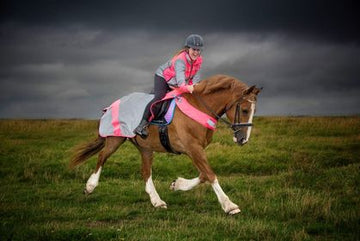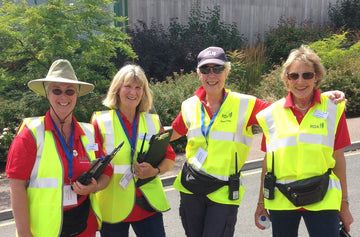Riding for the Disabled Association Calls on Government to Tackle Loneliness and Mental Health Issues through Volunteering
Riding for the Disabled Association (RDA) is calling on the government to prescribe volunteering as a method of tackling loneliness and mental health issues.
Following a survey of 1,629 volunteers, RDA is marking its 50th anniversary by launching a report on the impact of volunteering on health and wellbeing and the benefits for both RDA participants and the volunteers.
The report was presented at a Parliamentary Reception in Westminster, hosted by MP for Cheltenham, Alex Chalk on February 6, with the charity calling on the government to recognise the dual benefit that volunteering brings.

The Association’s 18,000 amazing volunteers contribute more than three million hours of their time each year and are the backbone of the organisation’s success. According to the report, 96% of these volunteers said that RDA had improved their overall satisfaction with life, while 81% said that volunteering makes them feel better about themselves.
With one in six people experiencing a mental health problem in any given week, the research is clear about the benefits of volunteering for mental health, as people gain more perspective and become less inward focused.
RDA and its horses benefit the lives of 25,600 disabled children and adults through its 500 groups across the UK. Volunteers form an integral part in helping to transform the lives of those they help, whilst as the report acknowledges having a measurable impact on their own lives.
As RDA celebrate its 50th anniversary, there is still much to do to increase the number of people who can benefit from their work and so they have developed three calls to action to deliver its future plans and meet the ever increasing demand for its services.
- Government to recognise that volunteering for RDA delivers dual benefit for both the community and the individual volunteer and also contribute to tackling loneliness, and improving mental and physical health.
- Local government and appropriate agencies, such as Clinical Commissioning Groups and local GP’s to signpost and refer volunteering opportunities through social prescribing, for volunteers to work with RDA.
- Existing and new funding partners to support RDA in reaching more volunteers and enabling more people to benefit from activities.
Ed Bracher, RDA Chief Executive, said; “The report shows clear and robust evidence that our volunteers feel more useful and better about themselves, they are more sociable and physically active and learn new skills and gained more confidence.
“With a clear sense of our future vision and direction, RDA is committed to attracting and supporting increasing numbers of volunteers.”
This vital research carried out by RDA was funded by Sport England, through the British Equestrian Federation, as part of a wider grant to support volunteer development.
Changing Lives through Volunteering
The people that volunteer with RDA come from all walks of life and span all ages. Many end up giving up their time as a way to help them with difficulties in their own lives. This often leads to a positive, life-enhancing improvement which is demonstrated by the findings of the RDA report.
Judi Singer ( third from left on image) was severely agoraphobic but, having been a horse rider in the past, decided to join her local RDA Group in Surrey in the hope it would change her life - and it did.
Said Judi: “To start with I was only happy leading at the horse’s shoulder and not really talking to anyone. I then progressed, through the kindness and understanding of my colleagues, to being able to join in the fun that everyone was having.
“Through the RDA volunteers’ non-judgemental understanding, I am now able to go anywhere, speak to anyone, chair meetings and speak in public.”
Facts and Figures
81% said that volunteering with RDA made them feel better about themselves.
88% said they felt like they belonged to the RDA Community.
93% said volunteering helped to keep them physically active
95% of RDA volunteers feel they have gained knowledge and skills.
80% feel the knowledge they have gained has helped them in other areas of their life
For further information visit www.rda.org.uk






